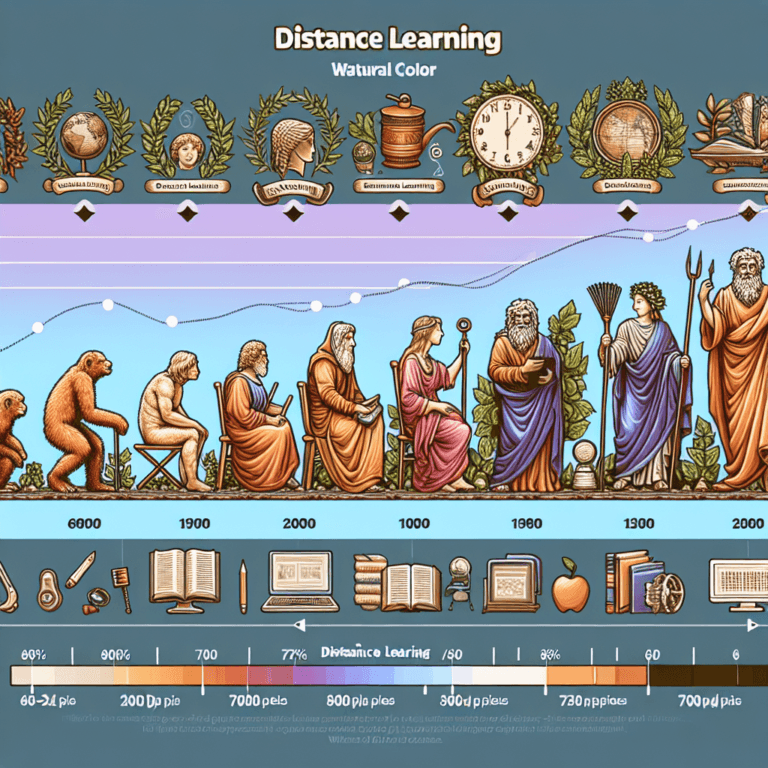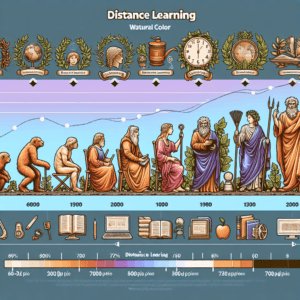The Evolution of Distance Learning: A Historical Perspective
Distance learning has undergone significant transformation over centuries, evolving from rudimentary methods of communication to sophisticated, technology-driven education. This historical journey reflects not only advancements in educational theory but also societal changes that have shaped how knowledge is delivered and consumed.
Early Developments
The origins of distance learning can be traced back to the 18th century when correspondence courses emerged. The first documented instance occurred in 1728, when the Boston Gazette advertised a course in shorthand offered by Caleb Phillips. Students would send in their work through the mail and receive feedback, marking the beginning of an educational approach that transcended physical boundaries.
By the late 19th century, distance education gained momentum, particularly in the realm of higher education. Institutions like the University of London established external degree programs, allowing students from around the world to study without attending classes on campus. This approach served an increasingly mobile society where barriers such as geography, financial constraints, and social expectations limited access to education.
The Rise of Print Media
The introduction of print media in the 19th century significantly advanced distance learning. Textbooks, study guides, and educational pamphlets became widely available, broadening access to educational resources. The emergence of the postal service further facilitated distance learning by enabling the seamless exchange of materials between instructors and learners.
Notable figures in this period included Sir Isaac Pitman, who developed shorthand systems and offered correspondence courses to an expanding audience. His initiatives were instrumental in demonstrating the effectiveness of learning through written communication.
Technological Advancements of the 20th Century
The 20th century saw rapid advancements in technology that transformed distance education once again. The advent of radio and television opened new channels for delivering educational content. In the 1920s and 1930s, educational broadcasts began to reach homes, with programs designed to supplement traditional curricula. These formats provided a more engaging approach to distance learning, allowing learners to access information in a dynamic and interactive way.
The introduction of the internet in the latter part of the century marked a pivotal moment for distance education. Institutions began recognizing the online medium’s potential, leading to the establishment of various online degree programs. The 1990s saw the launch of the first fully online universities, such as the University of Phoenix, which paved the way for a new generation of distance learning options.
The Digital Revolution
The turn of the 21st century brought a digital revolution that fundamentally changed the landscape of distance education. The proliferation of personal computers and internet access made learning more accessible than ever. Learning management systems (LMS) enabled institutions to deliver courses online, track student progress, and facilitate interaction among learners and instructors. The use of multimedia elements such as videos, podcasts, and interactive quizzes enriched the educational experience.
Social media platforms began to play a significant role in fostering community among remote learners. The ability to connect with peers for discussion and collaboration added an essential dimension to distance learning, breaking down social isolation often associated with remote study.
Recent Trends and Future Directions
The impact of the COVID-19 pandemic in 2020 accelerated the adoption of distance learning across all education levels. Schools and universities worldwide quickly transitioned to online formats, prompting both educators and learners to adapt rapidly. This shift highlighted the need for robust digital infrastructure and increased emphasis on digital literacy.
As institutions reflect on the lessons learned during this period, hybrid models of education—combining online and in-person instruction—are gaining traction. The flexibility of distance learning, coupled with the benefits of face-to-face interaction, presents a promising avenue for the future of education.
Emerging technologies, such as artificial intelligence, virtual reality, and augmented reality, hold the potential to further transform the distance learning experience. These innovations can create immersive learning environments and personalized educational pathways, catering to diverse learning styles and needs.
Conclusion
The evolution of distance learning illustrates a dynamic interplay between educational theory, technological advancements, and societal needs. From early correspondence courses to the rich digital environments of today, distance education has continuously adapted to meet the demands of learners. As education continues to evolve, distance learning will remain a vital component, fostering equity, accessibility, and innovation in lifelong learning. Through understanding this historical perspective, educators and learners can appreciate the journey and anticipate the possibilities that lie ahead.







